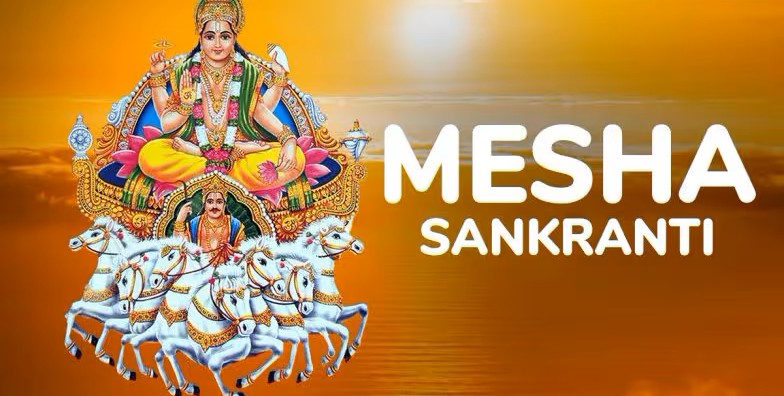
Mesha Sankranti marks the solar transit of the Sun into the zodiac sign of Aries, signifying the beginning of the solar new year in several Hindu calendars and typically occurring around April 14th. Celebrated across India with regional variations, it’s known as Puthandu in Tamil Nadu, Vishu in Kerala, Baisakhi in Punjab, Pana Sankranti in Odisha, and Pohela Boishakh in West Bengal, among other names. This day is considered highly auspicious for new beginnings, prosperity, and spiritual renewal, with many devotees engaging in holy baths, prayers to the Sun God and other deities, charitable activities, and the preparation of special festive foods. In many agricultural communities, it also marks the start of the harvest season.

This year, in 2025, Mesha Sankranti will be celebrated on Monday, April 14th. The auspicious Punya Kaal Muhurat will be from 6:22 AM to 12:39 PM. Within this, the Maha Punya Kaal will be from 6:22 AM to 8:28 AM . The exact time of the Sun’s transit into Aries, known as the Sankranti Moment, is at 3:30 AM on April 14th. Therefore, the entire day, especially the Punya Kaal, is considered propitious for various religious activities and new beginnings.
A common practice is taking a holy dip in sacred rivers like the Ganges or other local water bodies during the auspicious Punya Kaal, believed to wash away sins and bring good fortune. Many devotees offer prayers to the Sun God, acknowledging his vital energy and seeking blessings for a prosperous year. Charitable activities and donations are also significant, with people giving food, clothes, and money to the needy as an act of goodwill.
Mesha Sankranti marks the solar new year in several traditions, it’s often celebrated with new beginnings and festive meals. People might start new ventures or projects on this auspicious day. Special dishes are prepared, often including seasonal fruits and ingredients. In regions where it coincides with harvest festivals like Baisakhi, there are vibrant cultural celebrations involving music, dance, and fairs. Visiting temples dedicated to various deities, including Lord Vishnu, Lord Shiva, and local goddesses, is also a common way to observe the day and seek blessings for the year ahead.
Significance and Auspicious Timing
The movement of the Sun is highly revered in Hindu astrology, and Mesha Sankranti is considered an auspicious time for spiritual growth and prosperity. The day is marked by specific auspicious periods, known as Punya Kaal and Maha Punya Kaal, during which charitable activities and prayers are deemed particularly fruitful. As the Sun enters Aries, it is seen as a time of renewed energy and vitality. In 2025, Mesha Sankranti falls on April 14th, with the Punya Kaal extending from the early morning until midday, and the most auspicious Maha Punya Kaal occurring in the early hours.
Regional Celebrations and Customs
Mesha Sankranti is celebrated under different names and with unique traditions across India. In Tamil Nadu, it is known as Puthandu, celebrated with the preparation of a symbolic dish called “Manga Pachadi” representing the six tastes of life. In Kerala, it is celebrated as Vishu, marked by the “Vishu Kani,” an auspicious arrangement of fruits, vegetables, flowers, and other items viewed first thing in the morning. Punjab observes it as Baisakhi, a vibrant harvest festival with traditional dances like Bhangra and Gidda. Odisha celebrates Pana Sankranti with the consumption of “Pana,” a sweet drink, and the observance of various local traditions. West Bengal marks it as Pohela Boishakh, the Bengali New Year, with cultural programs, fairs, and festive meals. Despite the regional variations, the underlying theme of new beginnings, prosperity, and gratitude for the agricultural cycle remains consistent.
Observances and Charitable Activities
Common observances on Mesha Sankranti include taking holy dips in rivers or sacred water bodies, especially during the auspicious Punya Kaal, believed to cleanse oneself of past sins. Offering prayers to the Sun God is a significant ritual, acknowledging his life-giving energy. Many people also start new ventures or make important decisions on Mesha Sankranti, believing it to be an auspicious time for new beginnings and success. The day serves as a reminder of the cyclical nature of time and the importance of embracing change and renewal.